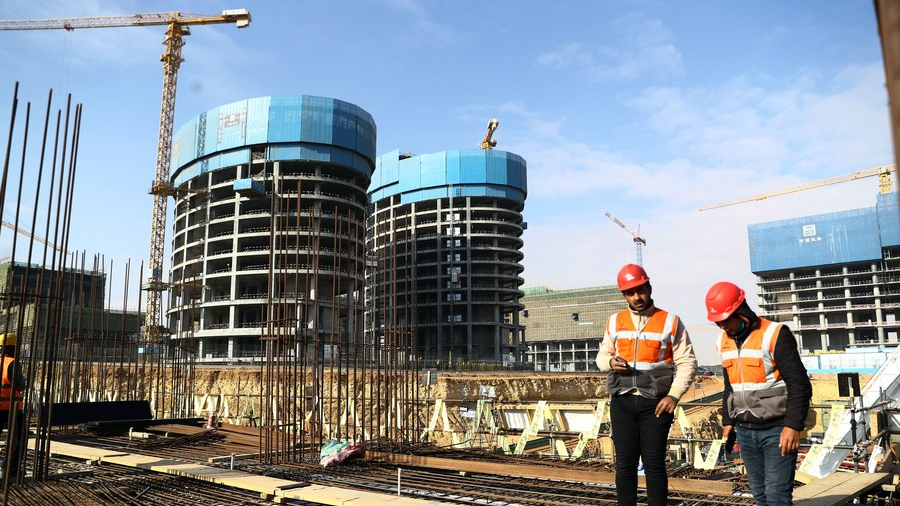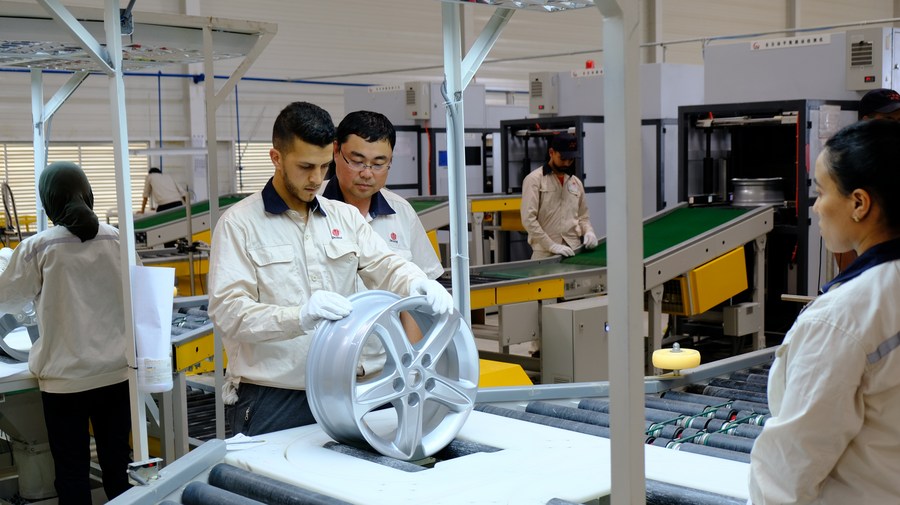
The construction site of the Central Business District (CBD) of Egypt's New Administrative Capital, is built by the China State Construction Engineering Corporation, January 4, 2020. /Xinhua
The construction site of the Central Business District (CBD) of Egypt's New Administrative Capital, is built by the China State Construction Engineering Corporation, January 4, 2020. /Xinhua
Editor's note: Hamzah Rifaat Hussain, a former visiting fellow at the Stimson Center in Washington and former assistant researcher at the Islamabad Policy Research Institute, is a TV anchor at Indus News in Pakistan. The article reflects the author's opinions and not necessarily those of CGTN.
Multiple rounds of talks took place in countries across the Middle East and Africa resulting in an increase in Chinese investments and meaningful, futuristic cooperation. Countries such as Morocco, Egypt, Kenya and Djibouti are benefiting from initiatives such as digital capacity building and building of infrastructure which can usher in a better future for both regions amid economic uncertainty.
For years, the Middle East and parts of Africa have borne the brunt of internal strife, domestic turmoil, government changes and transnational terrorism. As a result, growth potential despite enormous petroleum reserves, resources and tourism prospects have often been stymied due to prolonged uncertainty.
With the crisis raging in Ukraine and Western diplomacy failing to resolve the intractable impasse with Russia, countries across the Middle East and Africa have opted for meaningful bilateral cooperation to improve livelihoods and build resilient economies in the face of global supply chain disruptions and economic shocks. There is plenty to look forward to.
In North Africa, cooperation between China and Egypt is all set to reach new heights with a joint resolve expressed to invest in digital capacity building and information technology. Chinese Ambassador to Egypt Liao Liqiang spoke about how practical cooperation has intensified between the two sides over the years with an unwavering amount of trust defining the bilateral relationship.
Similarly in Morocco, a convergence of views on global conflicts also emerged between Beijing and Rabat, as was mentioned by both Special Envoy of the Chinese Government on the Middle East Issue Zhai Jun and Moroccan Minister of Foreign Affairs, Africa Cooperation and Expatriates Nasser Bourita. Note that both countries had similar stances with an understanding that alliance politics in a polarized environment will be a zero-sum game.

An aluminum wheel factory of the CITIC Dicastal Co., Ltd., at the Kenitra Atlantic Free Zone in Kenitra, Morocco, June 26, 2019. /Xinhua
An aluminum wheel factory of the CITIC Dicastal Co., Ltd., at the Kenitra Atlantic Free Zone in Kenitra, Morocco, June 26, 2019. /Xinhua
Bilaterally, Chinese investments have soared in Morocco with it becoming the first North African country to join the Belt and Road Initiative in January 2022. Furthermore, as per then vice chairman of China's National Development and Reform Commission Ning Jizhe, investments in Morocco dealing with mobile parts, telecommunications and fisheries have reached $380 million, which further demonstrates how economic cooperation grounded in principles of neutrality and trust can yield dividends.
Apolitical cooperation is gaining resonance in regions which have historically witnessed severe internal turmoil such as violence during and in the aftermath of the Libyan Civil War of 2011. Repeated American intervention in the domestic affairs of sovereign states only served to prolong conflicts in the absence of peaceful settlements which in turn, hampered economic growth.
There is a concerted attempt this year, however, to end perpetual conflicts in such regions, as has been witnessed at the eight-nation peace conference in East Africa. By promoting security, development and governance as top priorities, many of the issues facing states with a troubled history can be ameliorated, as mentioned by Chinese Special Envoy for the Horn of Africa Affairs Xue Bing.
Furthermore, construction of ports and railways, while also sending engineers and scientists to countries such as Djibouti and Kenya, is aimed at promoting universal prosperity in the absence of discord, conflict and war. All this takes place with permissiveness in Africa as mentioned by Professor Liselotte Odgaard from the Norwegian Institute for Defense Studies, also senior fellow at the Hudson Institute, who said that China would stick to a policy of non-interference and allow Africans to choose their own path.
In the Middle East, one of the lingering issues which successive U.S. administrations repeatedly failed to resolve is the Israeli-Palestinian issue. The security dynamics unfolding from the crisis has stymied investments, compromised sustainable peace and promoted disruption.
This year, Zhai Jun met Secretary General of the Arab League Ahmed Aboul Gheit in Cairo as well as Palestinian President Mahmoud Abbas in Ramallah and urged both Israelis and Palestinians to resume dialogue on a two-state solution at the Israeli-China parliamentary friendship group.
Such measures constitute proactive approaches to promote peace with the guiding principles of non-interference and neutrality, according to Benjamin Barton, assistant professor at the University of Nottingham's Malaysia campus. Such measures also compliment the immense trade potential which exists in the region, as exemplified in upward trends of investments such as construction engagements between China and the region which witnessed spikes of 360 percent and 116 percent as per a report by the Green Finance and Development Center in Fudan University.
With such promising trends, efforts to ensure sustainable peace and heightened economic the potential for ushering in great dividends for the Middle East and Africa is high. The rule is that solid ties in the absence of political meddling will always promise a bright future.
(If you want to contribute and have specific expertise, please contact us at opinions@cgtn.com. Follow @thouse_opinions on Twitter to discover the latest commentaries in the CGTN Opinion Section.)

